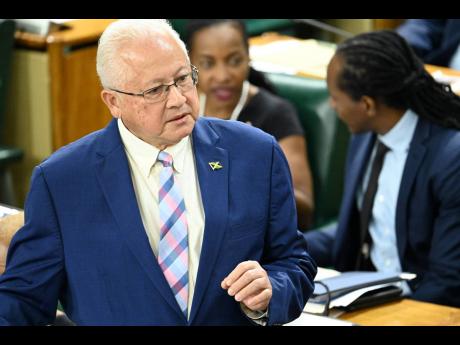Mark Wignall | I sympathise with you, Minister Chuck
Minister Delroy Chuck, as a politician trying to write and guide public policy in this difficult land called Jamaica, would sense, by n ow, that he is caught up on the horns of a dilemma.
He wants to advance a formula previously drawn by the PM to make corporal punishment in the home outlawed. In general,he wants the typical Jamaican household to appreciate using a softer hand in home disciplining. “Corporal punishment rarely works”, he says.
The proof of that is laid out right in front of us: our violent society. Mr Chuck has to make a plea to parents who are culturally biased in violent tendencies, and the children are no less so. In making an announcement on public policy, a Jamaican politician is forced to tease it. Chuck cannot readily construct a spectrum in defining corporal punishment, a stern voice, a soft hand, tough discipline, child abuse in his announcement. That may cause the main message to be lost.
The culture of violence in home discipline runs deep, and the heads of many Jamaican households are quite contemptuous of politicians taking away their right to practise violence on their children. In practical terms, even the most level-headed, well-mannered, academically comfortable child can go off the rails at times and cause a parent to yearn for something stronger than a swear word.
The experiment with parenting must begin with the parental mindset and teaching the child to buy into the approach from about three years old. At the other extreme is the parent who ‘stores’ the torture tool, like a thick leather or rubber belt hanging on a nail.
That behaviour continues until the child - at about 12 or 13 - hides a piece of iron pipe under her mattress and uses it to end her distress..
DID MARK GOLDING PROPERLY MEASURE UP?
A reader accuses opposition leader Golding of extreme tardiness in securing his Jamaican passport. The implication of that accusation is that the People’s National Party president was not fully committed to Jamaica. My lawyer friend responds. “As to why it took the leader of the opposition 46 years to obtain a Jamaican passport, first, did it indeed take that long. Is that information truly accurate?
“Second, assuming that to be the case, I do not know why. It could be ease of travel. A British passport allows easier travel around the world than a Jamaican passport. A Jamaican passport holder needs a visa to go nearly everywhere. The leader of the opposition did study in England. He has obviously been to the US and other countries. With the British passport, you do not need a visa to travel to many countries.”
The reader also takes Mr Golding to task for obtaining a diplomatic passport and later obtaining a Jamaican passport. My lawyer friend chimes in. “He was appointed a minster of government by former PM Simpson Miller and thus entitled to diplomatic immunity. Thus, a Jamaican diplomatic passport was warranted. It also made sense at the same time to obtain a regular passport to be consistent, that when he no longer enjoyed diplomatic immunity, he would still be able to use a Jamaican passport for travel. Please note the Jamaican Constitution allows him to be a member of Parliament and dual national because citizens of the Commonwealth (which England is) can serve in Parliament).”
CRIMINALITY CRIPPLING SMALL BUSINESS
Two years ago, the mother and daughter took what they had saved over the last 10 years, paid down on a modest two-bedroom house, and moved out of their ghetto, zinc- fence existence. The mother sold soup by the roadside, and it was deceptively profitable. The daughter ran a bar, and on weekends, she was always able to earn more than enough to restock for the following week.
Now, the future is unsure because two gangs are at it again, and many small businesses have had reasons to shutter their doors. “The police car park up and even if dem sey wi can open, wi don’t because di barmaid not coming. Sometimes a come and open two hours, but nobody not coming.
“About how much dem pay in extortion tax?” I asked my taxi-driving friend, who lives in a lane long known for violence. “My boy dem sensible, and dem want di business fi thrive. Dem only tek $50,000 a week.”
I was questioning him on a particular wholesale business establishment that did roaring business on the troubled stretch of road. Only one door of the business place was opened, but when it is being restocked, the trucks are huge. Small business people come from many miles away to purchase goods.
According to my taxi friend, “People come from Waltham and Maxfield because dem buy in bulk an get special price. Dem treat dem customer good and the tax man dem from di lane deal wid dem wid respeck.”
“So I did hear a ting bout some years ago: two faction from the same lane was muscling for the tax.”
“Yeah man. Two a dem. Di present bredda comfortable wid di $50,000. An him know sey if a emergency, him can go to di boss an get a ten pack from him. Den dis eediot come and a claim $100,000 fi di week.”
“So dat was a total of $150,000. So how dat work out?”
“Di boy haffi get slap whey. Him come late to di party and wan mash up di dance. Every ting cool now.”
The young woman with the bar is not so lucky. Her currency is uncertainty. Her mother still takes a chance with her pot of soup. “God is on my side,” she says. “A know you don’t believe, but what else can explain me still a survive?”
Mark Wignall is a political and public affairs analyst. Send feedback to columns@gleanerjm.com and mawigsr@gmail.com.

